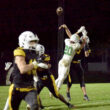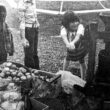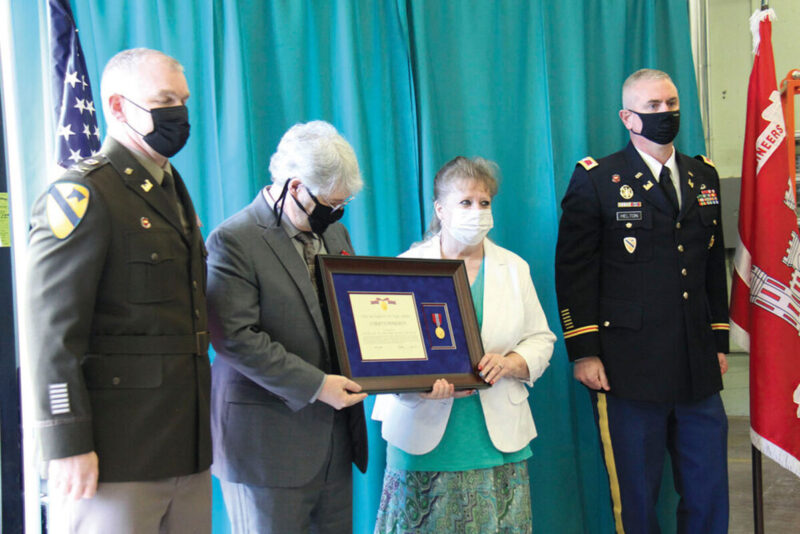By Scott Swanson and Sarah Brown
Of The New Era
When Mike Pomeroy’s wife Ronda asked him earlier this month what he was doing on Feb. 15, he told her he had no idea.
She told him they were going to the Foster Dam for a special event, but she wasn’t giving details.
“I said, ‘What am I doing?’ She said, ‘It’s none of your business,'” Pomeroy said Tuesday, Feb. 15, after he found out.
He was standing in a ceremony held in his honor, to award him a Department of the Army Civilian Medal of Valor for his heroism at Detroit Dam during the Beachie Creek fire on Sept. 8, 2020.
Pomeroy was working his normal 12-hour shift as a dam operator when the fire swept over the dam area, isolating him for some 40 hours as he kept the dam operations going.
Pomeroy, 57, of Lebanon, transferred to Foster a little over a year ago. He has worked for the U.S. Army Corps of Engineers for six years, first as a high-voltage electrical technician and then as an operator.
“I switched to operator thinking it would be safer,” he said.
Beachie Creek Fire Approaches
Pomeroy knew, when he started his 12-hour shift at Detroit in the middle of the night during the summer of 2020, that the Beachie Creek fire, which was first detected Aug. 16 in the Willamette National Forest’s Opal Creek Wilderness near Detroit, was spreading from the east, and that a windstorm was expected.
He and his co-workers discussed possible courses of action, should it pose a danger at the dam, but they weren’t too concerned at that point because it was miles away.
About midnight, the power’s main line tripped, so Pomeroy went to Big Cliff, a few miles downstream on the North Santiam River, to fix it.
“That’s kind of when the storm really started hitting hard,” he said.
“The winds were whipping up so heavy. It was, I don’t know, 50 miles an hour, I guess.”
While at Big Cliff, he found a law enforcement officer helping someone with a tire change. The wind was so loud, they had to yell to communicate, and that’s when the officer told Pomeroy they were at evacuation Level 3.
“But I still had things I had to get done,” he recalled. “I couldn’t leave the river in the state that it was in. I needed to get back up to Detroit and get the flows all stabilized to protect the river.”
Dam operators are responsible for a dam’s stability and flood control, said Tim Ernster, Pomeroy’s supervisor at the time.
As the fire evolved, flow control systems were shutting down, so Pomeroy would need to get the dam in a static state, functioning without human control, before the controls were completely offline.
“If we release too much water because we lose the system, and if anybody were taking shelter downstream, they could be washed out,” Ernster said.
“And if the system failed and the gate closed, we’d cut off the water supply to, like, the city of Salem and the residents in the canyon.”
Pomeroy was still able to communicate with his employer, the Army Corps of Engineers, and his wife at this time, and they decided he would finish stabilizing the dams and then evacuate at 5 a.m. Tuesday.
‘I Didn’t Realize How Bad It Really Was’
By the time Pomeroy climbed into his little Chevy Spark, the fire had already reached the dam and cut him off.
“I thought, ‘Well, OK, I’ll just drive through the fire line and out of here,'” he said. “But that was a big mistake. I didn’t realize how bad it really was.”
The farther he drove, the more debris he saw. Boulders, fiery fallen logs and tree limbs were scattered across the whole road, and a thick, Armageddon-like smoke made travel nearly impossible, he said. He could feel the fire’s heat as smoke began to fill his car.
“I also became aware that I didn’t drive through the line so much as I drove into it,” he said. “It wasn’t just a little fire. It was a swath. It was really wide.”
Pomeroy did a quick calculation in his head and realized it would take him about three hours to get 10 miles, he said.
Ronda Pomeroy was aware he was heading out and was relieved to think she’d see him soon. About 40 minutes later, he called.
“When he called me, I thought that he had made it down, but he was actually back at the dam,” she said. “That’s when I was really starting to get concerned. I knew that fire wasn’t the problem; it’s a concrete bunker. I was worried about the smoke, what it would do to him.”
Hunkering Down In Isolation
The dam is designed to handle any kind of hazard, but its ventilation system would pull smoke into the plant, Ernster said. If the air quality got bad enough, Pomeroy could have passed out and suffocated.
“Beyond that, the guys work around a lot of hazardous energy, rotating machinery,” Ernster said. “Having a sleep-deprived operator just trying to keep running the plant for an indefinite amount of time, the odds of him making a mistake and getting hurt were kind of going up, as well.”
Indeed, carbon monoxide levels were setting off alarms, but Pomeroy kept his mind busy as he made sure the dam’s equipment was safe, and that he was safe. He even opened the gates and visitor center, in case anyone retreated to the dam.
Communications were down by this point, and Ronda Pomeroy was unable to get through. Then his boss called her and said they’d lost communication with him. She didn’t know what to think, but she started to wonder if she’d lost him, she said.
“I was pretty worried,” she said. “I thought that he, you know, I didn’t get to say goodbye to him.”
Mike Pomeroy said he felt isolated and sad at that point.
“I didn’t get a chance to tell my family goodbye, because I didn’t know what the end result was going to be,” he said. “And I was sickened by the thought (about) what they were going through.
I couldn’t comfort them.”
About 24 hours after arriving for his shift, Pomeroy tried to sleep in the lowest part of the dam.
“But I couldn’t,” he said. “I just lay there for two hours looking at the ceiling.”
So he got up and looked outside, happy to see that, by all appearances, he was out of danger, he said. Then he saw a small red dot on the security monitor. Then several.
“I realized that the fire probably just now started reaching me,” Pomeroy said. “And it wasn’t very long after that I could see a full-blown blaze, a full-blown wall of fire heading towards the dam itself, heading towards me and the powerhouse and the dam. And in my mind what I said to myself was, ‘Well, I guess it’s game time.'”
At this point, the Army Corps had been trying to requisition helicopter flights with the National and Coast Guards to rescue him, but visibility made it impossible, Ernster said. All they could do was wait until firefighters and law enforcement could re-enter the area.
Pomeroy spent the next “exhausting” several hours staging breathing gear, water, food and other emergency supplies all throughout the dam in case he had to evacuate. By early Wednesday morning, he settled down for about an hour’s worth of sleep, despite the ongoing sounds of alarms.
“I just had to kind of take a chance and roll the dice,” he said. “I didn’t want to go to sleep before that, because that to me was putting chance in charge.”
Help Arrives
When he awoke, Pomeroy saw that the fire had passed and communication had been re-established with the outside world. Other dam operators were on their way.
Alexander “Lex” McClure, one of the operators, said they didn’t know what to expect when they arrived.
They’d lost communication for about 12 hours, with no word from Pomeroy .
“We were concerned, but we were glad to see that the power house was still standing when we showed up,” McClure said.
Pomeroy became emotional when he saw his team.
“There were a couple of operators and some of my coworkers on the maintenance side, they all showed up, my boss showed up, and it was a pretty emotional greeting,” he said.
Dam operator Camden Fernald was impressed by Pomeroy’s planning.
“Mike had put a lot of thought into contingencies and planning and sort of the ‘what if’ scenarios,” he said. “He had pulled all the little emergency air breathing canisters and spaced them out appropriately throughout the facility, such that if he ran into a scenario, he could easily reach one.”
Ronda Pomeroy expressed deep gratitude for the people who tried to rescue her husband, and for staying in contact with her. Down the ranks, from the commander down to an employee who also lived in Lebanon, they kept in touch during the entire ordeal.
“They were very good to us that whole time, which was a lifesaver for me, even though I cried a lot,” she said. “But, you know, they did help keep me hopeful that things were moving forward.”
Mike Pomeroy was grateful too.
“I just can’t say enough, from the crew they work with, and the operators and the maintenance guys, the men and women of the Corps – to do what they did, I’m just very thankful to all of them,” he said.
Heroism Recognized
Two Army colonels presented the medal at the ceremony last week before an audience that included three of the Pomeroys’ four children, his parents and his brother.
The event included a video with images recounting the devastating fire and Pomeroy’s actions, viewable at http://www.youtube.com/watch?v=i7mpjC2yL0A.
Col. Geoff Van Epps, commander of the Corps’ Northwestern Division, which includes 14 states and the Columbia, Snake and Missouri river watersheds, called Pomeroy “an uncommon public servant” and noted that the award ceremony was “the rarest of occasions.”
“I have never before seen a civilian award for valor and I just feel very humbled and very much honored to be here,” he said.
Van Epps first heard Pomeroy’s “incredible story” while working at the Pentagon in fall of 2020.
“It’s something from a movie,” he said, adding that he’s served five combat deployments of various lengths and seen service members honored for valor in combat. He noted that, while civilians are “almost never” asked to rise to such circumstances, Pomeroy was “so devoted to your task that you were willing to ride out the fire to make sure your duties were accomplished under the most trying circumstances imaginable.”
Col. Michael Helton, commander of the Portland District, said the entire Northwestern Division is “extremely proud of you” for rising to the occasion.
“I did want to say that training matters,” Helton said. “Mike, you were trained. You knew what to do in the heat of the moment, right – pun unintended.”
He credited Pomeroy with making sure “nothing happened to that dam, that flows were right, that the water supply to the community was protected, and was able to do so while protecting himself, “which we’re all very thankful for.”
Pomeroy said he was overwhelmed by the award, calling it “amazing.”
“I don’t know what to say,” he said. “Thank you.”
He related the story of a farmer whose horse ran away. Neighbors stopped by to commiserate. The next day, however, it returned, bringing seven wild horses with it. The neighbors returned to congratulate him on his lucky break.
“What a great turn of events!” they exulted.
“Maybe,” the farmer replied.
The following day his son, while attempting to break one of the new horses, fell and broke his leg.
The neighbors were back, noting the bad turn.
Then conscription officers came through the next day, looking to draft able-bodied young men. They passed on the injured son.
“Isn’t that good luck,” the farmer’s family told him.
“The whole process of nature is an integrated process of immense complexity,” Pomeroy said. “It’s really impossible to know whether anything that happens is either good or bad, because you now know what will be the consequences of misfortune, and you never know what will be the consequences of good fortune.
“And so this whole experience has taught me that lesson: Things come back out of misfortune and I’m very thankful for all of this.”





